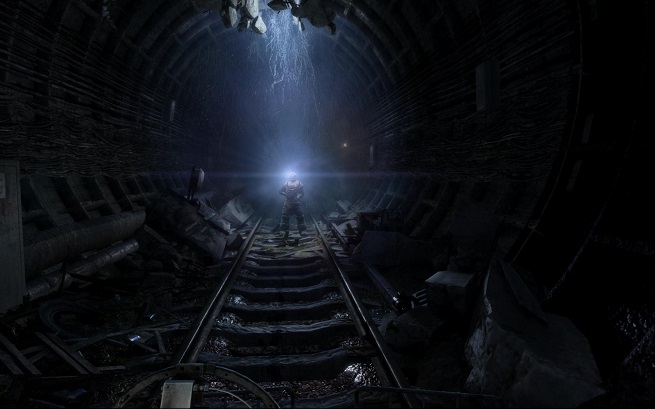
Warning: This article contains story spoilers for Metro: Last Light.
Metro: Last Light is watching you, silently judging your every move, deciding whether you are worthy of redemption.
Are you a good person? More precisely, are you unselfish? Are you concerned for the well-being of others? Do you have empathy? Or do you act with self-preservation in mind? Are you blind to the experiences, thoughts, and feelings of others? Are you unconcerned of the plight of those with whom you don’t identify?
If all this sounds a little familiar, that’s because developer 4A Games is treading similar thematic ground. I owe a large debt to critic Dan Thurot’s excellent analysis of Metro 2033, Last Light’s predecessor, where Thurot boils 2033 down to its core:
And then, if you’re dense, Khan just spells out the theme. “You reap what you sow,” he tells you. “Force answers force, war breeds war, and death only brings death. To break this vicious cycle, one must do more than just act without any thought or doubt.”
2033 expresses the growth (or lack thereof) of player-protagonist Artyom through the consequences of your decisions. The heart of Thurot’s dissection of 2033 — whether you kill other humans, whether you go out of your way and use your limited supplies in the service of helping the unfortunate, and whether you listen to the hardships of downtrodden, even your foes — also applies to Last Light, which likewise keeps a memory of these seemingly inconsequential decisions and acknowledges them with a quick visual flash and a sound effect.

Above: Do you care about the thoughts, desires, and needs of these children?
This is all to establish, as Thurot puts it, whether you are a “Good Man,” and depending on what you’ve done, 2033 can end in either Artyom’s embrace of his fears or the opening of his mind to an alternative path forward that breaks Khan’s “vicious cycle.” In other words, do you answer force with force? War with war? Death with death? Or will you reject that doctrine?
Last Light goes a step further and — in addition to tracking Artyom’s character development — asks whether you understand the consequences of your decisions. It doesn’t just present you with vignettes to listen to or survivors to assist. Last Light will frequently subject the diligent explorer to the human cost of the nuclear apocalypse.
You’ll witness the ghosts and skeletons of Moscow — literally — in their final moments. On the surface, carcasses hold shotguns in their bony mouths. Specters appear as hanging black shadows. In the aftermath of the atomic devastation, people succumbed to desperation, fear, suicide, vicious mutations of nature … and even one another.
Why must you be witness to such horrors? Because you unleashed the same destruction. In 2033, you pushed the button.
Last Light follows the “bad” ending of 2033, where Artyom successfully launched a nuclear strike from D6, an abandoned pre-apocalypse military facility, at the home of a radiation-assisted evolution of the human species, known by the denizens of the Moscow Metro as the Dark Ones.
Have you come to terms with what you’ve done yet? This is Last Light’s journey.

Above: A vision of the impact on the Dark Ones’ home as seen in Last Light. Khan stands to the right of your former self as the atomic fire rages in the background.
Do you understand your greatest sin?
2033 spent much of its time overtly convincing you that the Dark Ones were a menace to the relatively small number of people trying to scrape by in the dark, cramped tunnels of the Metro. Your fellow survivors interpret an anomaly as a psychic attack perpetrated by the Dark Ones, and from that moment, a series of events set in motion that put you on a path to rally the Metro and eliminate this gravest of threats.
Under the surface, though, 2033 subtly hinted that the Dark Ones were attempting to reach you through an unexplained telepathic link, but you instead construe those as attacks on your mind. In the end, a dying Dark One — whom you shot — grasps in vain for the targeting laser that you pointed at its home as the missiles ascended into the gray sky.
You only realize later, at the beginning of Last Light as Artyom — now a decorated Ranger in the Order — voices his own internal doubts about that fateful decision, that you may have been mistaken. Khan, a fellow Ranger, believes a young Dark One may have survived the blast and wants to go out searching for it with you. He believes you are key to communicating with the creature, but Colonel Miller is suspicious of the whole endeavor. Instead, the Rangers’ best sniper, Anna, will accompany you with orders to kill on sight.
You are conflicted about the order. You’re not sure whether you should kill this creature or befriend it. You’re not yet prepared to make that decision, though. You require an understanding of the gravity of pressing the button — especially while those you trust are praising you for your past actions. And you can’t fully grasp that until you feel the sting of betrayal yourself. Twice.
